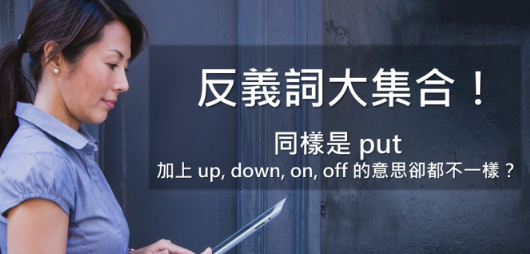in/out 篇
intro/outro
intro 是指一首歌的「前奏」,是在主歌和副歌都还没开始前的音乐,前奏通常不会有歌手的歌声,只会有管弦乐团的演奏。
outro 则是前奏的反义词,代表一首歌的「结尾」,是比较口语的用法。如果想用 ending 这个单字来表达「结尾」也是可以的喔!
income/outcome
大家都对 income 这个字不陌生吧? income 是指「收入」,尤其是金钱上的收入。
outcome 则是指一件事的「结果、最终影响」。
run into someone/run out of something
run into someone 是指「偶然遇见某人」,不是指跑向某人喔!
run out of something 则是指「消耗完某物品」,是相当口语且实用的说法。像是如果你遇到多年不见的酒友,想跟他喝个痛快,却发现家里的酒喝完了!这时就可以用 ran out of beer 来描述喔!
I ran into my drinking buddy at school yesterday.
我昨天在学校偶然遇见了我的酒友。
Let’s get wasted!
我们来喝个痛快吧!
Sure! But I ran out of beer. Let’s go get some!
没问题!但我家的啤酒喝完了。我们去买一些吧!

insight/out of sight
insight 是指「洞察、深入见解」,是一种对事情有相当深刻的感触,进而启发对此事的深入见解。
out of sight 则是指「看不见」,并不是像视障者般地看不见,而是指某事物在眼前消失,或者某事物离开视线的意思。而这也衍伸出了一个片语 “out of sight, out of mind”,意思是「眼不见为净」喔!
on/off 篇
put on/put off
put on 可以指「穿上」,像是穿上衣服,鞋子,香水等等;而「喷香水的动作」可以用 put on some perfume,或者 wear some perfume;若是要形容「身上喷有香水的状态」则是 wearing perfume 喔!
put on 同时也可以指「增加」,像是增加体重,就可用 put on some weight 来描述!
She’s putting on some perfume.
她正在擦香水。
She wore some perfume on her wrist.
她在手腕上擦了些香水。
She’s wearing perfume.
她擦了香水。
I think I’m too skinny. I want to put on some weight.
我觉得我太瘦了。我想增重。
put off 则是指「推迟、拖延某事」。像是期末考快到了,你只好推迟跟同学的聚餐,赶快拯救期末考!
I’m afraid we’ll have to put off our dinner party. We must save our final exam first!
我们恐怕要延后晚餐聚会了,得先拯救我们的期末考啊!
再介绍给大家一个超实用经典名言!
“Never put off till tomorrow what you can do today.” – Thomas Jefferson.
这句话也就是杰佛逊所言之「今日事,今日毕」啦!
onset/offset
onset 是指「事情的开端、前兆」,通常指不好的事情的开端,像是台风来临的前兆,或者经济衰退的开端,都可以用 onset 来描述。
offset 则是指「补偿、抵销」,有种「为了先前的过错而尝试弥补」的意味。
Playing League of Legend three days before the final exam can be seen as an onset of being flunked!
期末考前三天还在打 LoL 可能是被当的前兆!
I need to get a better score on my finals in order to offset my poor midterm.
我期末考要考好一点,才能抵销之前考不好的期中考。
take on/take off
take on 是指「接受」,通常是接受挑战、责任。
take off 有四种意思,可以指「脱掉衣物」、「飞机起飞」、「休假」、「突然离去」,可以根据上下文判断 take off 到底是哪种意思,小心不要搞混了喔!
In the movie Hunger Games, Katniss volunteered to take on the challenge as a tribute.
在电影《饥饿游戏》里,凯妮丝自愿接受挑战,成为贡品。
Why don’t you take off your jacket before the plane takes off?
你何不在飞机起飞前把外套脱掉呢?
Lisa took a day off, and took off for the hospital.
Lisa 请了一天假,然后匆匆离开,前往医院。
on-screen/off-screen
on-screen 是个很口语的用法,意指「在电视、电影里」,或者「在大萤幕上」。
off-screen 则是 on-screen 的反义词,指「在幕后」、「在萤光幕下」。
Jennifer Lawrence is always extremely mature and reliable on-screen.
珍妮佛劳伦斯在大萤幕上总是给人很成熟可靠的感觉。
Off-screen, on the contrast, she is a spirited, delightful lady with a great sense of humor.
相反地,萤光幕下的她则充满活力、讨喜又有幽默感。
up/down 篇
stand up/stand down
stand up 有四个意思,可以单纯指「起立」,也可以指「放某人鸽子」;如果加上 for,变成 stand up for,意思则是「为某人辩护、发声」;而如果加上 to,变成 stand up to,则是指「面对、经得住」,像是面对现实世界、经得住困难等等。要小心不要搞混了喔!
stand down 则是指「退下」。通常在电影里看到军官命令士兵退下时,就会用 stand down 来描述喔!
Everybody, stand up!
通通有,起立!
I got stood up!
我被放鸽子了!
John stood up for his right.
John 替自己的权利发声。
Few are brave enough to stand up to tyranny.
几乎没有人能勇敢地面对暴政。
Soldiers, stand down!
士兵们,退下!
back up/back down
back up 当动词时,意思是「支持某人」,是种与你共同进退的承诺;而当名词时要记得把空格去掉,写成 “backup”,指的是「支援、援军」或是「备用的」。
back down 则是指「放弃、打退堂鼓」。像是有部好莱坞动作片就叫做 “Never back down” ,中文译作「永不退缩」呢!
Will you back me up?
你会罩我吗?
The commander decided to back up the front line soldiers with more backup units.
指挥官决定用更多的后援部队来支持前线的士兵。
It started raining cats and dogs in the middle of the hike. Since we had no backup plan, we had to head home early.
登山到一半的时候忽然下起了滂沱大雨,我们没有其他备案,只好提早回家。
turn up/turn down
turn up 可以指「把某事物调高」,例如调高音量或调高暖气温度;也可以指某人的「出现、到场」。
turn down 则是 turn up 的反义词,指「把某事调低」,例如调低音量或调低暖气温度;或者指「拒绝」的意思。
The DJ turned up just in time, he then turned up the music.
DJ 恰恰好到场,并且调高了音乐音量。
Please turn down the radio.
请把收音机关小声一点
I’m afraid I’ll have to turn down your request.
我恐怕得拒绝你的要求。
put up/put down
put up 可以当作「提供」;如果加上 with,变成 put up with,则会变成「忍耐某人 / 事」的意思喔!
put down 则是指「杀害」,像是杀害人、动物,都可以用 put down 来描述。
They required the company to put up a $50 million bond. ─ Wall Street Journal
他们要求公司提供 5 千万的债券。 ─ 《华尔街日报》
I just can’t put up with my neighbors anymore!
我对邻居忍无可忍!
The hunters put down the elephants with no mercy.
猎人们毫不留情地杀害大象。







